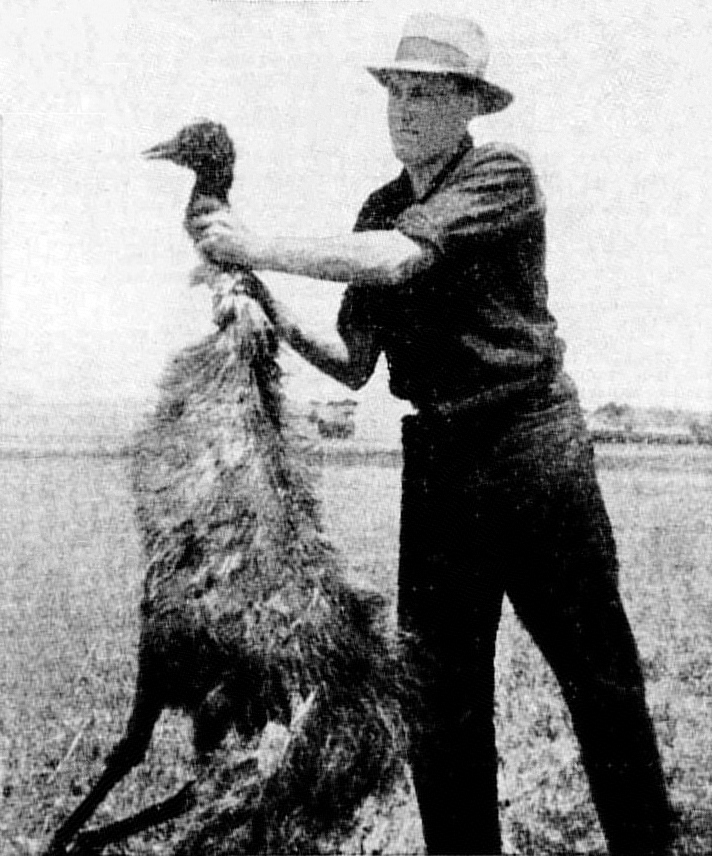The Great Emu War of Australia was an unusual and some say ill advised battle between the government and the big birds of Australia. Australia is known for its unique wildlife, which includes the Emu, a large flightless bird known for their speed and agility.
To understand why the government took issue with these animals we must go back to World War I. After the war, many Australian veterans were given land to farm in Western Australia, as a part of a government initiative to reward their service. When the Great Depression hit in 1929, these farmers were encouraged to increase their wheat crops. The government promised subsidies for the wheat, though it ultimately failed to deliver on this.
The farmers were also caught in a tough market with falling wheat prices. In 1932 they then faced an additional and unusual problem – a massive emu population explosion. Thousands of emus migrated inland during their breeding season descended upon the farmlands of Western Australia, causing extensive damage to crops and infrastructure.
Faced with the emu onslaught, the farmers appealed to the government for help. The emus were not only devouring their wheat and destroying fences but also proving to be quite elusive targets.
In response to the farmers’ pleas, the government decided to take action. The Minister of Defense at the time, Sir George Pearce, approved a plan to deploy military forces armed with Lewis machine guns to combat the emu menace.
On November 2, 1932, the “war” officially commenced. Major G.P.W. Meredith led two soldiers, Corporal S. McMurray and Gunner J. O’Halloran, armed with two Lewis machine guns and 10,000 rounds of ammunition to the battlefield – the farmlands of Western Australia.
Their mission was to reduce the emu population and alleviate the farmers’ woes. But the soldiers soon discovered that emus were not the easiest of foes. The birds were swift, agile, and adept at scattering in the face of danger.
When the first shots rang out, the emus scattered in all directions, making them difficult to target. Despite their best efforts, the soldiers found it challenging to kill a significant number of emus, and the birds seemed to mockingly dodge the bullets.
The initial battles proved futile for the soldiers. The Lewis machine guns jammed frequently, and the emus remained unscathed. Major Meredith reported that only a few emus were killed during the first encounters. Even the local media found the situation absurd, with one newspaper declaring that the “Emus were Invulnerable to Bullets.” The emus, it seemed, were winning the war.
After a series of unsuccessful skirmishes, the soldiers reevaluated their approach. Major Meredith decided to mount one of the Lewis machine guns on a truck, hoping to increase mobility and accuracy. This adaptation also proved ineffective as emus outran the vehicles.
As the emus continued to damage the farmers crops, the government decided to make a second attempt to cull the big birds and sent more soldiers, including Meredith, into battle.
By the end of December 1932, the government soldiers had claimed victory, but it was a limited one. They estimated that they had killed around 1,000 emus, which was only a fraction of the estimated 20,000 emus that had plagued the farmlands. With the government’s ammunition running low and the war’s cost escalating, the operation was eventually abandoned. The emus, having endured a barrage of bullets, retreated for the time being.
The success of the operation was questionable and highlighted the absurdity of using military force against birds. But it also offered some valuable lessons and insights: The event highlights how government decisions can sometimes be poorly thought out or executed, leading to absurd and costly consequences.
The Emu War also underscores the importance of wildlife conservation and sustainable farming practices. Today, Australia takes more measured approaches to manage conflicts between wildlife and agriculture.
